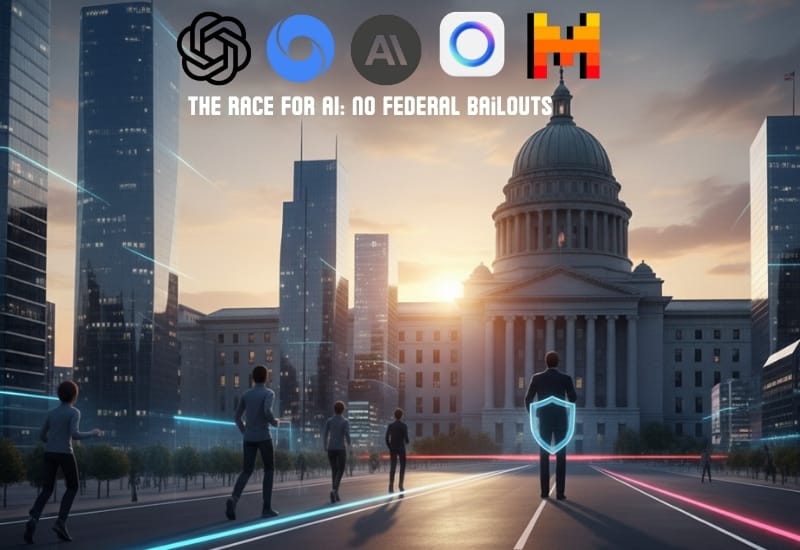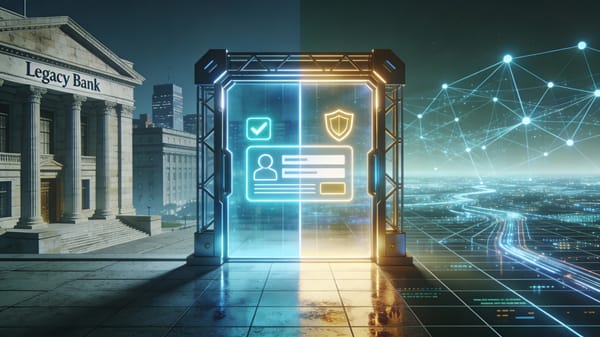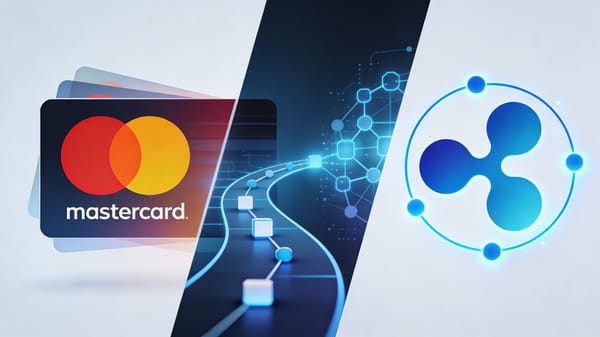No Bailouts for AI: Why Government Subsidies for OpenAI Would Set a Dangerous Precedent
OpenAI briefly sought government loan guarantees for its $1T+ infrastructure push before backtracking. With 5+ major AI competitors, should taxpayers bail out billionaires? David Sacks says no: 'Buildout not bailout.

OpenAI's Chief Financial Officer, Sarah Friar, sparked controversy at a Wall Street Journal conference on November 5 when she suggested that federal loan guarantees could help finance the company's infrastructure expansion, which is expected to exceed $1 trillion. The comment triggered immediate pushback from tech industry leaders and raised serious questions about whether taxpayers should backstop one of the world's most valuable private companies.

David Sacks, Trump's AI advisor, promptly rejected the idea, stating "there will be no federal bailout for AI" and noting that "the U.S. has at least 5 major frontier model companies" that could fill any gap if one fails. His response highlights a critical reality: the AI industry has sufficient competition that government intervention to prop up winners would be both unnecessary and damaging.
That said, we do want to make permitting and power generation easier. The goal is rapid infrastructure buildout without increasing residential rates for electricity.
— David Sacks (@DavidSacks) November 6, 2025
Buildout not bailout https://t.co/e7MW7CzUY5
— David Sacks (@DavidSacks) November 6, 2025
The Subsidy Request and Swift Backtrack
According to reports from the conference, Friar explained that government backing could attract the enormous investment needed for AI computing infrastructure, given the uncertain lifespan of AI data centers. She stated the company was "looking for an ecosystem of banks, private equity, maybe even governmental" partners, noting that federal loan guarantees would "really drop the cost of the financing" by enabling OpenAI to borrow at lower rates.
The proposal was unusual for a Silicon Valley tech giant. Such guarantees would theoretically reduce OpenAI's borrowing costs since the government would absorb losses if the company defaulted, while also dramatically expanding the company's potential lender pool.
However, just hours later, Friar backtracked on LinkedIn, clarifying that "OpenAI is not seeking a government backstop for our infrastructure commitments" and that she had "used the word 'backstop' and it muddied the point." Instead, she reframed her comments as a broader statement about American technological strength requiring both private sector and government involvement.
But Friar's comments weren't made in isolation. One day earlier, CEO Sam Altman had made similar remarks during an interview with economist Tyler Cowen, suggesting that governments could serve as "the insurer of last resort" for AI projects.
Sam Altman's Non-Profit to For-Profit Transformation
The subsidy controversy comes amid OpenAI's contentious transformation from its founding mission as a nonprofit dedicated to ensuring AI benefits humanity.
OpenAI was founded in 2015 as a nonprofit with "the goal of building safe and beneficial artificial general intelligence for the benefit of humanity." The company raised millions in donations, including from co-founder Elon Musk.
In October 2025, OpenAI completed its recapitalization, splitting the AI lab into a for-profit public benefit corporation nested inside a nonprofit foundation. Under the new structure, the nonprofit OpenAI Foundation holds a 26% equity stake in the for-profit OpenAI Group, with Microsoft holding approximately 27%.
The transformation marks a dramatic shift from the company's origins as a nonprofit devoted to developing open source AI technology for the betterment of humankind to the closed-source, profit-seeking entity that it is today, with its $500 billion valuation.
The restructuring faced significant opposition. Initially, OpenAI had announced plans to fully convert to a for-profit structure that would remove control from its nonprofit parent, but reversed course in May 2025 "after hearing from civic leaders and engaging in constructive dialogue" with attorneys general from Delaware and California.
Japanese conglomerate SoftBank agreed to invest $30 billion into OpenAI, but only if the company completed its restructuring by year-end, otherwise withholding about $10 billion of its pledged investment.
Elon Musk's Blistering Critique
No one has been more vocal in criticizing OpenAI's evolution than Elon Musk, who co-founded the company with Altman in 2015.
Musk has accused OpenAI of becoming a "closed source, profit-maximizer" and sued the company, first in California state court and later in federal court. He invested $45 million in the startup between 2015 and 2018 before his falling out with Altman. In 2023, Musk launched xAI, his own rival to OpenAI, further escalating tensions.
Twelve former OpenAI employees filed an amicus brief supporting Musk's lawsuit, with former researcher Todor Markov declaring that Sam Altman "was a person of low integrity who had directly lied to employees." Markov stated that "the charter had been used as a smoke screen, something to attract and retain idealistic talent while providing no real check on OpenAI's growth."
OpenAI countersued Musk in April 2025, alleging he has been trying to slow down a competitor through "press attacks, malicious campaigns broadcast to Musk's more than 200 million followers" and "harassing legal claims." A federal judge suggested in February 2025 that she was unlikely to halt OpenAI's restructuring, noting the case was essentially "billionaires versus billionaires."
Why Bailouts Would Be Terrible Policy
The idea of government backing for OpenAI's infrastructure investments faces three fundamental problems:
1. Robust Competition Makes Intervention Unnecessary
The AI industry features intense competition among at least five major frontier model companies: OpenAI, Anthropic, Google DeepMind, Meta, and xAI. Google DeepMind's Gemini 2.5 family now rivals Claude and ChatGPT, consistently topping performance leaderboards. Meta has embraced open source AI via its Llama models as a competitive strategy. The race has become "a genuine head-to-head competition" with major upgrades rolling out every three to six months.
As David Sacks noted, "If one fails, others will take its place." The market has sufficient players that no single company's survival is essential to AI development.
2. Questionable Financial Fundamentals
OpenAI has committed to spend about $1.4 trillion on infrastructure, equating to roughly 30 gigawatts of data center capacity. Yet the company generates only about $13 billion in annual revenue and expects to lose $5 billion this year.
When investor Brad Gerstner questioned how a company with $13 billion in revenue could afford $1.4 trillion in commitments, Altman deflected rather than providing a substantive answer. This raises serious questions about whether taxpayers should absorb the risk of financing a business model with such extreme cash burn relative to revenue.
3. Privatizing Profits While Socializing Losses
Government loan guarantees would create a dangerous dynamic where OpenAI's investors and executives capture all upside while taxpayers bear the downside risk. The proposal would theoretically reduce OpenAI's borrowing costs since the government would absorb losses if the company defaulted.
If OpenAI succeeds, its private investors reap massive returns. If it fails, taxpayers get stuck with the bill. This represents the worst form of crony capitalism—picking winners in a competitive market while forcing citizens to underwrite the risk.
The Right Approach: Infrastructure, Not Bailouts
David Sacks articulated the appropriate government role: "We do want to make permitting and power generation easier. The goal is rapid infrastructure buildout without increasing residential rates for electricity."
This approach focuses on removing regulatory barriers and improving energy infrastructure that benefits the entire AI industry and broader economy—not selecting specific companies for preferential financing terms.
The U.S. government should create conditions for AI innovation to flourish through:
- Streamlined permitting for data centers and power generation
- Investment in energy infrastructure
- Supporting AI research at universities and national labs
- Maintaining competitive markets free from anticompetitive behavior
What it should not do is provide loan guarantees or financial backstops to any particular AI company, no matter how prominent.
Conclusion
OpenAI's brief flirtation with requesting government subsidies—quickly walked back after public backlash—highlights the tension between its nonprofit origins and current for-profit reality. The company now claims it will build "the best-equipped nonprofit the world has ever seen", but actions speak louder than words.
With at least five major frontier model companies competing vigorously, the AI industry has sufficient competition that no single player's success or failure justifies government intervention. Taxpayers should not be asked to underwrite the massive infrastructure bets of any AI company, especially one with questionable financial fundamentals relative to its spending commitments.
The AI race will be won by companies that can attract private capital, manage costs effectively, and deliver genuine value to customers—not those that secure government handouts. As Sacks succinctly put it: "Buildout not bailout."
DISCLAIMER: This newsletter is for informational purposes only and does not constitute investment advice, advertising, or a recommendation to buy, sell, or hold any securities. This content is not sponsored by or affiliated with any of the mentioned entities. Investments in cryptocurrencies or other financial assets carry significant risks, including the potential for total loss, extreme volatility, and regulatory uncertainty. Past performance is not indicative of future results. Always consult a qualified financial professional and conduct thorough research before making any investment decisions.
Sources
- OfficeChai: Sam Altman, OpenAI CFO Hint at Govt Backing
- ZeroHedge: David Sacks Responds To OpenAI
- TechCrunch: OpenAI completes its for-profit recapitalization
- Futurism: OpenAI Successfully Sheds Its Roots as an Ethical Non-Profit
- ProMarket: OpenAI Abandons Move to For-Profit Status After Backlash
- Fortune: 12 former OpenAI employees support Musk's lawsuit
- NBC News: OpenAI feud between Elon Musk, Sam Altman faces federal judge
- CNN Business: Open AI countersues Elon Musk
- Fortune: OpenAI and DeepMind losing engineers to Anthropic
- Axios: OpenAI wants to get to $1 trillion a year in revenue
- VKTR: Moats or Myths? How OpenAI, Anthropic and Google Plan to Stay on Top
- Axios: AI companies' triathlon: Who's leading in models, users and infrastructure



